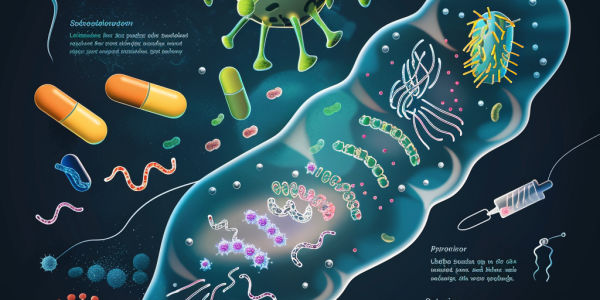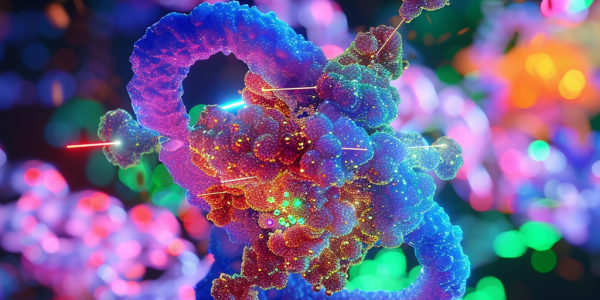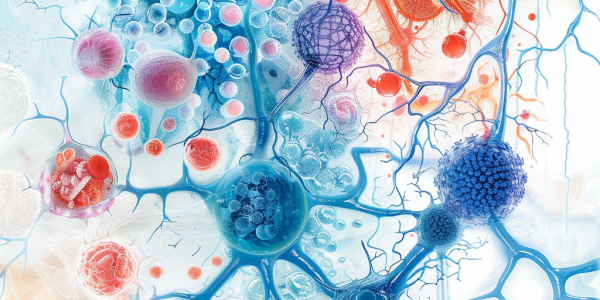Research Reveals Protective Role of CO₂ in Cellular Health
Recent research from the University of Utah reveals a surprising role for carbon dioxide (CO₂) in protecting cells from oxidative stress, a key factor in diseases like cancer and neurological disorders. The study shows that bicarbonate from dissolved CO₂ alters the Fenton reaction, reducing harmful DNA damage. This groundbreaking discovery highlights the potential therapeutic benefits of CO₂ in cellular health, challenging its negative perception in climate discussions.
Breakthrough Discovery in Bacterial Protein Regulation Offers Hope for New Therapies
A new study from Ludwig Maximilian University reveals the discovery of EfpL, a bacterial protein that regulates protein biosynthesis in response to cellular metabolism. This groundbreaking mechanism could lead to innovative therapeutic strategies against human pathogens like Salmonella and E. coli, offering hope for combating antibiotic-resistant infections.
New Algorithm SPRINTER Enhances Understanding of Cancer Cell Proliferation
A groundbreaking study published in Nature Genetics introduces SPRINTER, a novel algorithm that analyzes tumor cell proliferation at a single-cell level. Developed by researchers from the TRACERx and PEACE consortia, SPRINTER enhances our understanding of cancer evolution, particularly in non-small cell lung cancer (NSCLC). This innovative approach leverages single-cell genomics to map the growth rates of genetically distinct tumor clones, paving the way for personalized cancer treatments and improved therapeutic strategies.
New Strategy Targets Aurora-A Protein for Advanced Cancer Treatment
A groundbreaking study from the University of Birmingham reveals a novel strategy to target the Aurora-A protein in cancer treatment. By focusing on inhibiting the Aurora-A and TACC3 interaction, researchers have discovered a peptidomimetic approach that preserves Aurora-A’s function while potentially reducing toxicity. This innovative research could lead to more effective and safer cancer therapies, highlighting the importance of targeting protein-protein interactions in cancer drug development.
Understanding Axonal Morphology and Its Impact on Neuronal Function
In the digital age, understanding cookie consent and privacy is essential for online users. This article explores the importance of managing cookie preferences and highlights a recent study on axonal morphology, revealing how membrane mechanics influence the structure and function of unmyelinated axons in the nervous system.
Kyoto University Study Reveals New Insights into Chromosome Behavior During Meiosis
Kyoto University researchers have made groundbreaking discoveries about chromosome behavior during meiosis, revealing how chromosomes measure their lengths and determine the dissolution of cohesin. This study, published in Current Biology, provides crucial insights into the mechanisms of cell division and its implications for genetic disorders and reproductive health.
University of Illinois Develops Revolutionary DNA Nanorobot for Virus Detection and Prevention
Researchers at the University of Illinois Urbana-Champaign have unveiled the NanoGripper, a revolutionary nanorobot made from DNA that can detect and neutralize viruses, including COVID-19. This innovative device mimics human hand functionality, utilizing a four-fingered design to grasp viral threats and prevent infections. With potential applications in drug delivery and rapid testing, the NanoGripper represents a significant advancement in nanomedicine, promising improved public health outcomes.
Researchers Unveil Comprehensive Human Cell Map in Medical Breakthrough
Researchers have unveiled a groundbreaking map of human body cells as part of the Human Cell Atlas project, aiming to enhance understanding of health conditions and diseases, particularly cancer. This high-resolution, open-access atlas will serve as a vital resource for future medical research, potentially leading to significant breakthroughs in treatments and health outcomes.
Breakthrough Study Reveals Unique Growth Patterns of Tuberculosis Bacterium
Researchers have made groundbreaking discoveries in understanding the growth patterns of Mycobacterium tuberculosis (Mtb), revealing its unique linear growth mode and significant heterogeneity. These insights, published in Nature Microbiology, could lead to more effective treatment strategies for tuberculosis, a persistent global health challenge.
Navigating Privacy Choices and Breakthroughs in Liver Research
In the digital age, privacy concerns rise as websites use essential and optional cookies for user experience. Users can manage cookie preferences to protect personal data, while a recent study in Nature Cell Biology reveals liver senescence’s systemic effects, highlighting TGFβ signaling as a potential therapeutic target. Stay informed about data protection and innovative health research.










